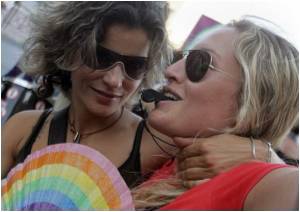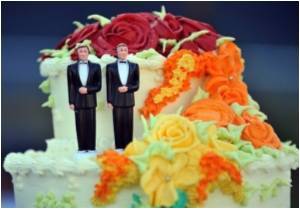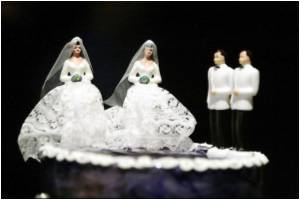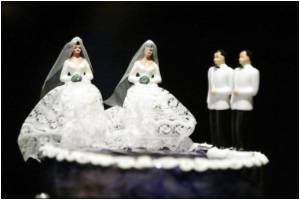Dutch pair Helene Faasen and Anne-Marie Thus walked down the aisle into the history books 10 years ago as the world's first legally wed lesbian couple, a distinction they now employ in activism.

By tying the knot in front of the world's press, "we wanted to make other people think about how horrible it is to be denied something that is a natural right for others," added her wife, 44-year-old notary Helene Faasen.
"A heterosexual person never needs to think about whether he is allowed to marry or not, he simply needs to be lucky enough to find the love of his life."
The Netherlands was the first country to legalise same-sex marriage, in 2001. Faasen and Thus, both in traditional, flowing wedding gowns, exchanged the first nuptials alongside three pairs of grooms in Amsterdam on April 1 that year before then mayor Job Cohen.
Since then, nearly 15,000 gay and lesbian couples have wed in the Netherlands -- about two percent of the total number of marriages registered between 2001 and 2010, based on figures from the Central Statistics Bureau.
According to the Amsterdam-based COC, the world's oldest homosexual advocacy group, there are about a million gay, lesbian, bisexual and transgender people in the Netherlands out of a total population of 16.7 million.
Advertisement
Their children were born from Thus and anonymous sperm donors.
Advertisement
"In the mornings, we also have to nag our children to get out of bed and eat breakfast ... it is all very normal," she added.
The children, said Faasen, accept their family setup "as just one of the many options that exist".
"The only objection our son ever had was for having to do double the work on Mother's Day."
The couple is fiercely protective of their privacy, insisting on being interviewed at Faasen's Amsterdam office rather than at home, but say they lift the veil for special occasions in the name of advocacy.
"We like to show how very dull and normal we are," said Faasen, winking at her partner.
"It is not the Sodom and Gomorrah many people apparently expect to result from the legalisation of gay marriage".
Ten years after the couple's milestone wedding, gay marriage is still illegal in many countries. Gay sex is banned and punishable in some states, and carries the death penalty in Iran.
Even in the traditionally liberal Netherlands it appears the honeymoon is over, says the COC's Philip Tijsma.
"It is somewhat of an irony that because it is easier for homosexual people to come out of the closet and be open about their sexuality, they are also more visible and easier for homophobes to target," he said.
In 2009, a total of 428 homophobic incidents, nearly a fifth involving physical violence, were reported around the country -- an increase of 13 percent on 2008, according to the latest available police figures.
A recent justice ministry study found that seven out of ten gay, lesbian, bisexual or transgender people had encountered physical or verbal violence in their lives.
Nearly half of Dutch polled for a recent study said they found it objectionable to see two gay men kissing in public.
"As a homosexual person, the whole world concerns itself with your private life, even though you are not into anything weird or freaky or scary for the children. Those are, of course, the prejudices," said Faasen.
On April 1, the couple will mark their anniversary, just as their wedding, in public -- attending the press opening of a photo exhibition arranged by the Amsterdam city council to commemorate their historic day.
"We were lucky that others had taken up the fight and made it possible for us to get married," said Thus.
"If other people need us now, especially in countries where it is not yet legal, we want to be there for them."
Source-AFP









